The Roman Empire Fallacy
The unbearable pain of seeing too far into the future.
Have you ever looked at the U.S. and thought, ‘man, this looks a lot like the late stage Roman Empire’?
Powerful but divided. Rich but corrupt. Glamorous but dysfunctional.
A source of marvelous technological achievements but unable to build things as it used to.
Ruled by incompetent politicians, owned by a small elite, its masses trapped by unsustainable debt and distracting themselves with endless mind-numbing entertainment.
A nation struggling to meet the many challenges it faces. A people in deep spiritual crisis. In other words a vast empire about to tumble?
Of course you have. You, me, and everybody else.
It’s not a new idea either. People have been making this comparison since at least 1895:
Historian Edward J. Watts dedicated an entire book, The Eternal Decline and Fall of Rome, to this phenomenon. “The decline of Rome,” he writes, “has been a constant source of discussion for Romans and non-Romans for more than 2200 years.”
Everyone from American journalists in the twenty-first century AD to Roman politicians at the turn of the third century BC have used the decline of Rome as a tool to illustrate the negative consequences of changes in their world. — Edward J. Watts
In other words, Roman decline was used as an argument in politics even while Rome was still ascending (as it faced numerous setbacks).
Watts points out a speech by Ronald Reagan during which the future president bemoaned the “cultural, economic, and social ailments” of the changing American society of the late 1960s. These issues included high taxes, stifling bureaucracy, a waning commitment to military service, and the expanding welfare state. Sound familiar?
The question is not whether the U.S. empire, like Rome, will eventually decline. All empires do.
The obvious question is how long a decline takes to unfold and whether it can be predicted. A natural follow-up is what to do with that knowledge. A subtle yet important second order question is whether we can even think rationally about this issue.
The fate of empire
In 1976, British military officer and historian Sir John Glubb outlined a framework in his essay The Fate of Empires (if you don’t want to read the full 26 pages, here is a recent commentary). While empires had “almost every possible variation of political system,” Glubb believed they all passed through the same stages on their path to climax and collapse:
The Age of Pioneers (outburst)
The Age of Conquests
The Age of Commerce
The Age of Affluence
The Age of Intellect
The Age of Decadence.
An initial period of conquest is followed by an explosion in commerce and accumulation of wealth. This new affluence leads to spending on education, arts, science. “And yet,” wrote Leo Nicolletto, “Glubb noted, time and again—from Ancient Athens to the Arab Caliphate to China’s Song dynasty—an empire’s intellectual peak arrives just moments before its fall.”
Glubb saw the reason for the decline in a shift of values and attitudes across generations. “During the military period,” he wrote, “glory and honour were the principal objects of ambition.” Yet to the rising merchant class, “such ideas are but empty words, which add nothing to the bank balance.”
At first, popular enthusiasm is devoted to military glory, then to the accumulation of wealth and later to the acquisition of academic fame.
The empire becomes decadent, defensive, and anxious to protect its wealth. In the end, it is consumed by political division, pessimism, and toppled by a rising neighboring power.
Glubb noticed that empires lasted for about 250 years or ten generations. This seemed long enough to “transform the hardy and enterprising pioneer into the captious citizen of the welfare state.”
Glubb’s sample was biased. He was not knowledgeable enough about East Asian, African, and Latin American empires to include them in his analysis. He noted that if he had been a millionaire, he would have funded a university department dedicated to studying “the rhythm of the rise and fall of powerful nations throughout the world.” Still, his work seems to align with Ray Dalio’s framework from The Changing World Order.
How late is late?
To assess an empire’s age, Glubb focused on the changes in the minds and hearts of its citizens. He pointed out a shift in attitude “from service to selfishness” due to the “spiritual disease” of decadence. Empires ended with a mood of “cynicism, pessimism and frivolity.”
The first direction in which wealth injures the nation is a moral one. Money replaces honor and adventure as the objective of the best young men.
Glubb viewed money as a key “agent” of decline because greed displaced the sense of duty and dedication that made the empire’s rise possible. “To the merchant,” he wrote, “values like glory and honour are but empty words, which add nothing to the bank balance.” In the late stage empire, the rich further their own interests while the poor feel no investment or obligation towards their nation.
Realizing the unfolding decline, people become desperate for distraction and entertainment (bread and circuses…). “The heroes of declining nations are always the same,” he warned, “the athlete, the singer or the actor.” It reminded me of Stefan Zweig’s account of pre-WWI Vienna, a city obsessed with the arts and asleep to the imminent fall of its empire.
Frivolity is the frequent companion of pessimism. Let us eat, drink and be merry, for tomorrow we die.
Glubb also pointed at an unexpected “intensification of internal political hatreds”. When the Byzantine Empire was threatened by the Ottoman Turks, one would have expected its citizens to unite and “abandon personal interests.” Instead, “the reverse occurred.”
The Byzantines spent the last fifty years of their history fighting one another in repeated civil wars.
Glubb pointed out a kind of spreading nihilism. The empire’s citizens would “no longer make an effort to save themselves” because they were not convinced that “anything in life is worth saving.” Depressing stuff.
Glubb passed away in 1986, before the fall of the USSR (an empire that lasted only 69 years). Dalio also tried his hand at timing empires and suggested the US was “roughly 75% through” its cycle. Is it any surprise then that we’re seeing a lot of gloom and doom out there?
Ray Dalio, this should not surprise anyone, thinks the U.S. will have a debt crisis.
In his conversation with Todd Combs, Charlie Munger ominously hinted that “the Great Depression came from excesses which in many ways aren't as bad as those we have now.”
Paul Tudor Jones just warned about the risk of a vicious fiscal spiral.
Howard Marks reiterated his thoughts on gloomy times for financial markets, what he called the sea change.
A year ago, Stanley Druckenmiller noted that the drivers behind the secular bull market in financial assets since 1982 not only stopped but reversed.
With a recession on the horizon, a new cold war, and rising global conflicts, we can expect this chorus to intensify. Unfortunately, all of the following can be true: prophets of doom…
May tell people what they want to year (Jeremy Siegel was once told by his publisher that doom outsells optimism by three to one),
May be biased in their perception of long-term developments, and
Can be right.
Therefore, anyone dabbling in macro and geopolitics needs to develop a sense of history and investigate a prediction’s track record.
For example: worries about debt, deficits, and the dollar have been present since at least the debt boom of the 1980s. Traders like Paul Tudor Jones, who correctly anticipated the 1987 crash, then incorrectly concluded it was the beginning of another Great Depression, an unwinding of the great debt cycle (which instead continued and accelerated until today). Stanley Druckenmiller and others have been pointing out the unsustainable trend of entitlements for decades. Jim Chanos and others have been warning about China’s debt and real estate bubble since the financial crisis. It is much easier to identify an unsustainable trend than to precisely predict its end.
Human nature may even strain against seeing the very long-term clearly. What if our minds start melting at the intersection of history, markets and (geo)politics?
Mental time warp
In Consilience, biologist E.O. Wilson explained our perception of time with the example of a conversation: why does it take place over the course of minutes or hours, not “millionths of seconds or months”?
The answer is that human beings are constructed of billions of cells that communicate across membranes by chemical surges and electrical impulses. To see and speak … entails a sequence of these units covering seconds to minutes, not microseconds or months.
Seconds and minutes are the amount of time it takes to form a thought, express it, and for the other person to listen, process, form a response, and so forth. “We think of that span of time as normal,” Wilson wrote, “and somehow standard for the world in which we live. It is not.” Our minds “dwell entirely in organismic space,” which is not the time space of the societies, nations, and systems we examine.
We also know from behavioral economics that the mind can struggle with evaluating the long-term (hyperbolic discounting claims that we prioritize near-term rewards disproportionately) and self-importance (self-serving bias claims that we credit for positive outcomes yet look for accountability for mistakes somewhere else).
In other words, we like to think of ourselves and the moment we live in as meaningful. This is called chronocentrism, “the belief that one's own times are paramount, that other periods pale in comparison.” We tend to believe that it is our generation that is destined to be on “the very cusp of history”.
And perhaps this is why our talent for pattern recognition starts breaking down when it comes to long-term trends. In the long-run, as Keynes said, we are all dead. And that’s a thought we’d rather avoid.
Few things are as satisfying to an investor as making a correct contrarian macro call. What if you spotted an important Big Short-style event, but your analysis showed it would occur in, say, fifty years? That’s an almost unbearable thought. Who wants to be right about history but not be around to witness it (let alone profit from their insight)?
Nobody wants to be Logan Roy and die in episode three of a ten season finale. We don’t want to end our lives on a cliffhanger. No, we want to know the ending. In other words, if we have to live through the empire’s decline, we might as well witness the final fireworks.
The fallacy and lessons of empire
The fallacy is not that the United States doesn’t share parallels with Rome. All empires do.
The fallacy is not that history is not important or doesn’t rhyme. Quite the contrary.
The Roman Empire Fallacy is to see the world’s fate on the horizon, then bend its arc to fit our lifespan rather than face the discomfort of our own mortality. The drama of human history is written with indifference to the shortness of our lives. Perhaps trees and mountains, if we could ask them, would make better macro forecasters.
Now, what are we supposed to do with this idea? A few principles stood out to me so far:
Avoid false precision. I remain skeptical that something as complex as the fate of an empire (or market) can be predicted with precision. When encountering a narrative that fits the Roman Empire Fallacy, look at its history. Ask what changed to make it more likely to happen now. Consider the forecaster’s incentives. The more imminent the predicament, the more attention it will get.
Resilience over prediction. Glubb noted that even though the lives of empires
were “surprisingly uniform,” they all fell in different ways. We can’t predict what external and internal forces and events will end our current age and what will emerge afterwards. It is more important to be prepared for unpredictable volatility than to try and profit from a specific scenario.
Awareness of your bias. Make an inventory of your beliefs and examine how they shape your lens on the world. Stanley Druckenmiller always caveats his comments: “I've had a bearish bias for 45 years that I've had to work around. I like darkness.” If you want to avoid falling for a narrative, you need to understand what you are most likely to believe.
Be clear about what is certain… Empires fall, currencies decline, debt cycles end. The prosperity we take for granted can disappear. Glubb warned that the West had become accustomed to effortless and automatic progress. Citizens of the empire failed to draw history’s “obvious conclusion”, namely that material wealth was “the result of courage, endurance and hard work.”
…but seek out optimism. As the Roman Empire fell, others rose. There is always a bull market happening somewhere.
Protect your mind. Watch out for the poisonous mindsets identified by Glubb: pessimism, cynicism, political division, and the escape into entertainment and distraction. In the twilight of empire, these may seem pervasive, but they are choices. Don’t fall into the trap of letting your environment determine how you think.
Our choice
The more time I spent with this piece, the more I realized that it was just the start of a broader inquiry. There is much to be explored about how to live through an age of transformation and upheaval. The most important choice may be how we frame our story.
As Watts noted, Rome’s lengthy history offered an abundance of episodes to fit any narrative. The tale of an imminent and inevitable decline can be soothing because it relieves us from feeling responsibility. It leads to escapism and nihilism. It robs us of our agency and dilutes our virtues. Every day, we face a crucial choice:
Do we interpret a decline as a temporary setback or the beginning of the fall?
Do we see ourselves as players during a zero-sum endgame or agents of transformation and renewal?
Do we join a chorus of cynics and fan the flames of division with blame and resentment, or do we go against the flow of public sentiment and embrace restoration, re-connection, and collaboration.
“The past that we choose to describe,” Watts writes, “can ultimately shape the future we experience.”
One of these paths can make our society stronger. The other will tear it apart. It is up to us. — Edward J. Watts
No matter what happens to the empire, how you live matters. How you act towards your family, your friends, your neighbors, and your community makes a difference. You may not be able to turn the wheels of history, but you can shape the arc of your own life. You can uplift those around you. You can resist the Roman Empire Fallacy.
Thank you for reading,
Frederik




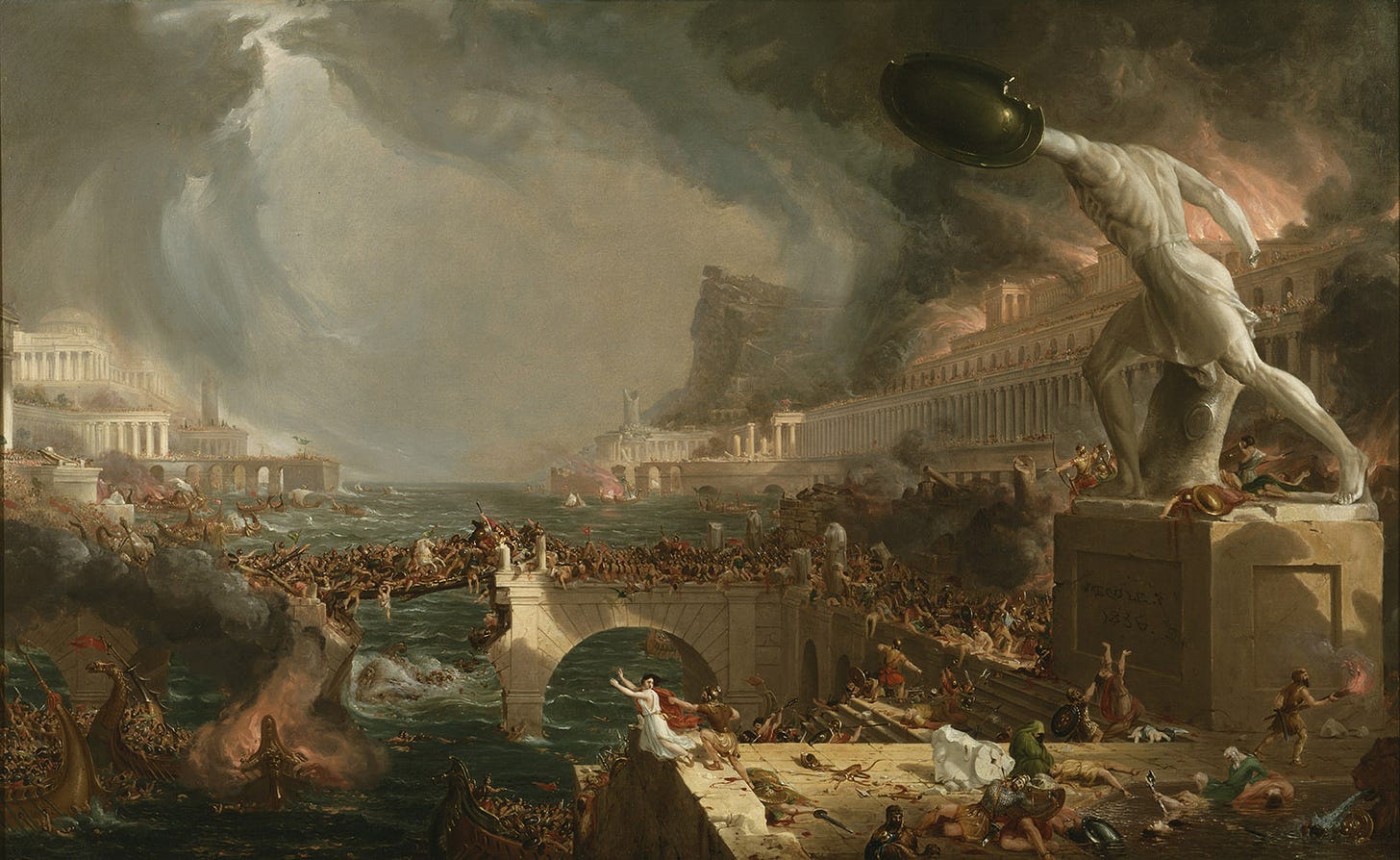
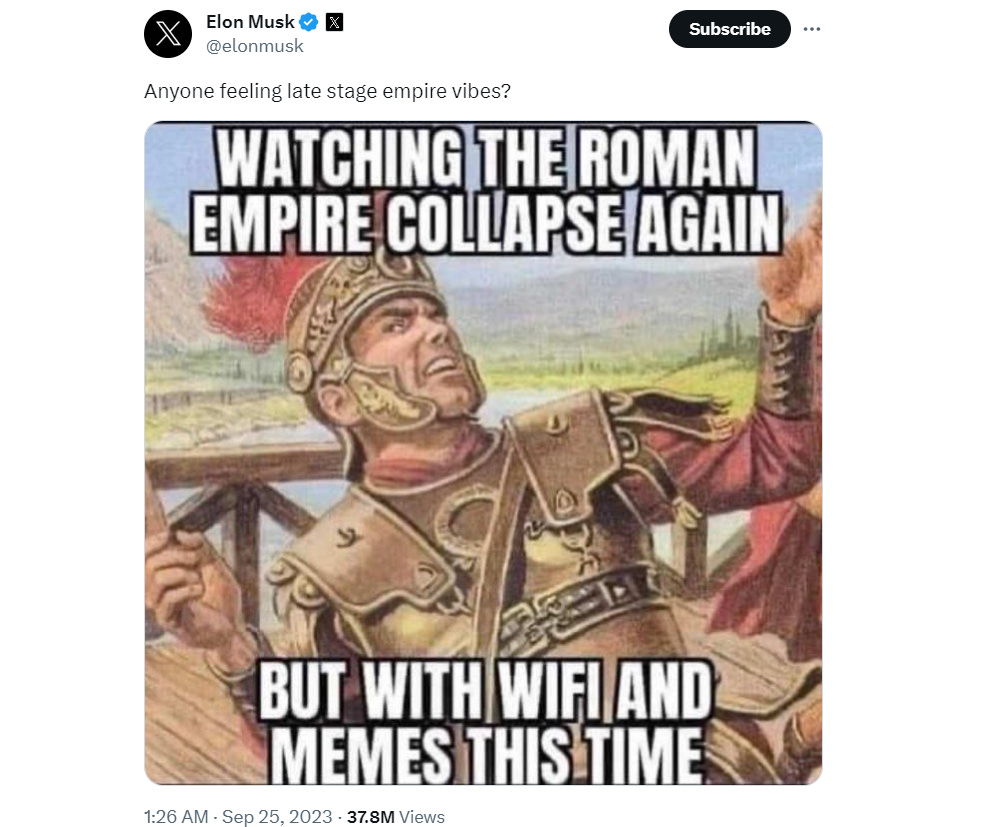

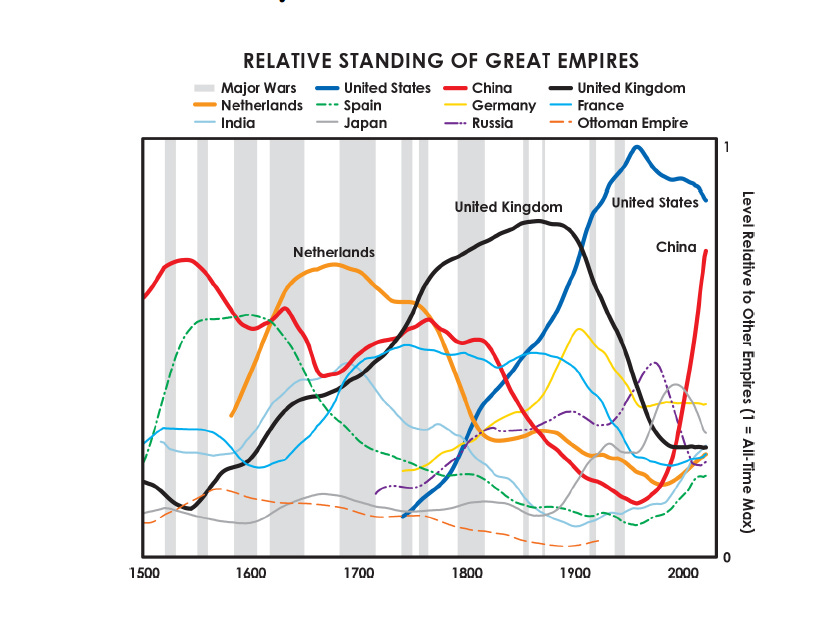
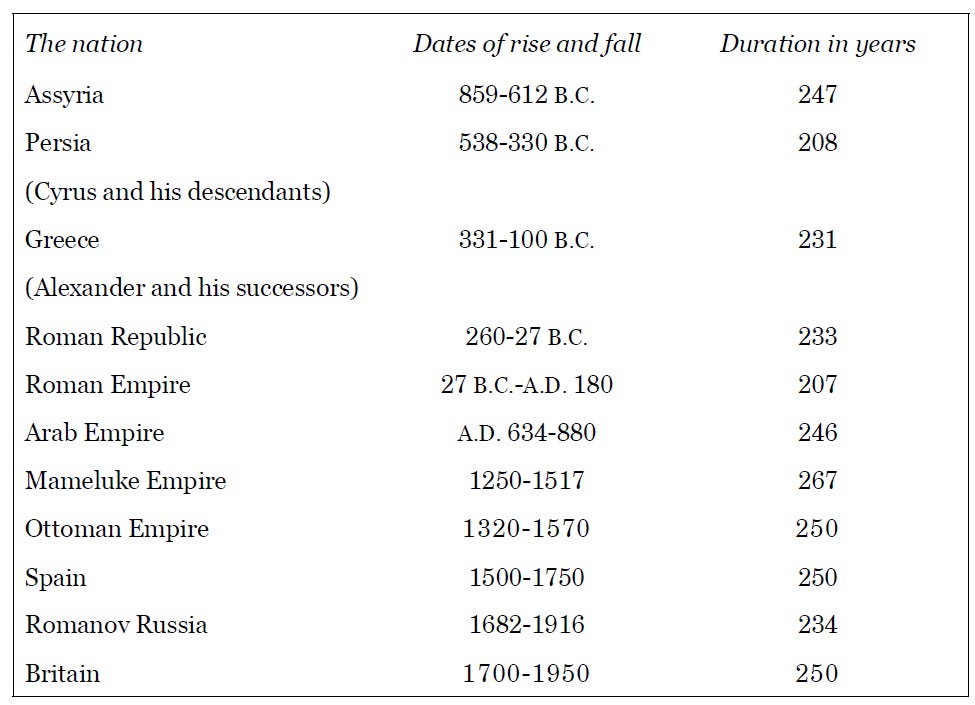
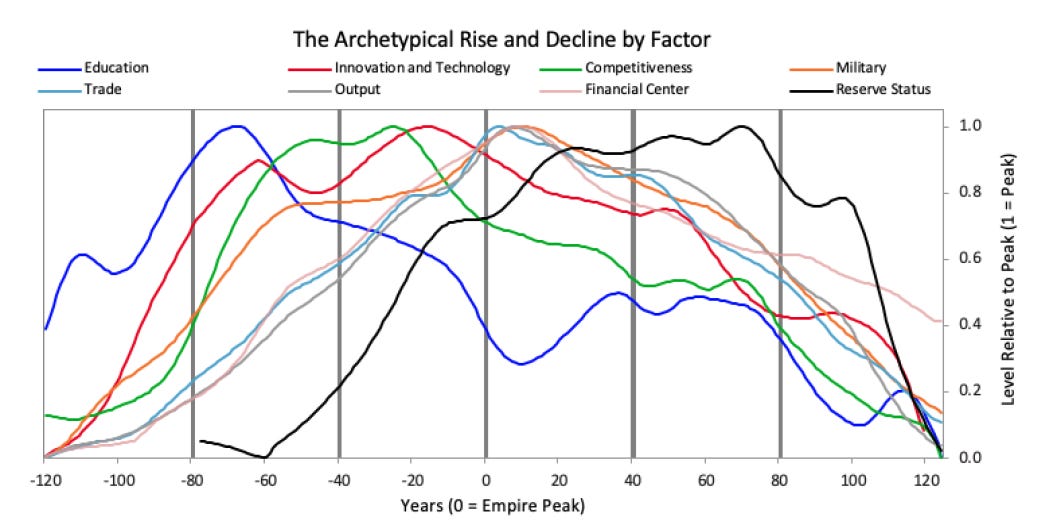




This was a great read.
However I think the premise is not apt.
The current rules based international order is not an empire, it is therefore unlike any previous 'empire' and it is not apt to compare it to an empire. We've never enjoyed anything like what we currently have before. We went from zero to one and should analyse it accordingly.
Thank you, Frederik. This is a near-impossible subject to make a cogent point on in any number of words. Despite that, you hit a home run in a short article.